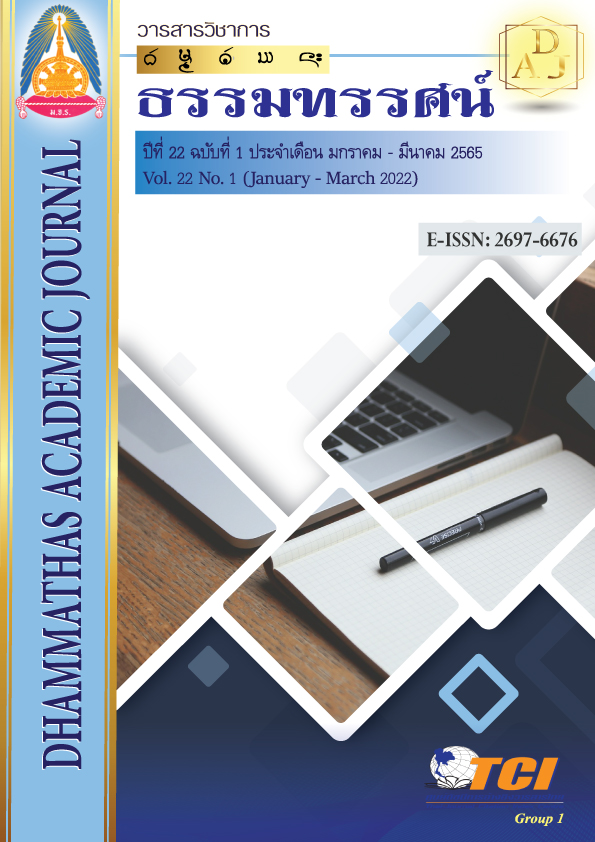An Analytical Interpretation of Philosophy on Phramalai literature
Main Article Content
Abstract
This article aims to analytic of philosophy in Phramalai literature, namely, metaphysics, epistemology and ethics with was used to study, analysis and synthesis of data from related document and literature.
The study found that: This PhraMalai literature consists of 3 pass; metaphysics Epistemology and Ethics which each pass is a collective state that collects the sub-contents in each component as a whole. Both of which are responsible for making the content completely interconnected.
In metaphysics, although Phramalai’s literature does not accept that there is god whom creator the world but it accept there are divinity. The being of divinity result of merit while living as a human being. The divinity is not the absolute Being and there is no power inspired by the concept of god in Hindu philosophy. Also metaphysics in Phramalai literature is the acceptance of cyclicalism in Hindu philosophy but the cycle of birth and death is according to his own karma and is beyond the decree of god. Epistemology in this literature is a knowledge of moral such as any action will be born in hell or what kind of deeds were born in heaven? Phramalai has the status of a messenger received from God of death (Phraya Yom) and Phrasriariyamettrai (Metteyya). The transmission of epistemological knowledge of Phramalai has the goal for guiding the way of ethical behavior. Phramalai explained the cause and effect of the action and the result obtained from this action. When human knows that to do evil than be born hell, the man is afraid to do it. And knowing that doing good is born in heaven and it motivated to do good. However the doing good or bad is something that each human being will choose to do and receive its own results, this is significant to study of Phramalai literature
Article Details

This work is licensed under a Creative Commons Attribution-NonCommercial-NoDerivatives 4.0 International License.
เพื่อให้เป็นไปตามกฎหมายลิขสิทธิ์ ผู้นิพนธ์ทุกท่านต้องลงลายมือชื่อในแบบฟอร์มใบมอบลิขสิทธิ์บทความ ให้แก่วารสารฯ พร้อมกับบทความต้นฉบับที่ได้แก้ไขครั้งสุดท้าย นอกจากนี้ ผู้นิพนธ์ทุกท่านต้องยืนยันว่าบทความ ต้นฉบับที่ส่งมาตีพิมพ์นั้น ได้ส่งมาตีพิมพ์เฉพาะในวารสาร วิชาการธรรม ทรรศน์ เพียงแห่งเดียวเท่านั้น หากมีการใช้ ภาพหรือตารางของผู้นิพนธ์อื่นที่ปรากฏในสิ่งตีพิมพ์อื่นมาแล้ว ผู้นิพนธ์ต้องขออนุญาตเจ้าของลิขสิทธิ์ก่อน พร้อมทั้ง แสดงหนังสือที่ได้รับการยินยอมต่อบรรณาธิการ ก่อนที่บทความจะได้รับการตีพิมพ์References
ดอกรัก พยัคศรี. (2554). พระมาลัย ฉบับวัดดอนขนาก ต.ดอนยายหอม อ.เมืองนครปฐม จ.นครปฐม. นครปฐม: ศูนย์มานุษยวิทยาสิริธร.
พระพรหมคุณาภรณ์ (ป.อ.ปยุตฺโต). (2558). นรก-สวรรค์ในพระไตรปิฎก. กรุงเทพฯ: ธรรมสภา.
มหาจุฬาลงกรณราชวิทยาลัย. (2539). พระไตรปิฎก ภาษาไทย ฉบับหลวงเล่มที่ 11 13 และ 15. กรุงเทพฯ: มหาจุฬาลงกรณราชวิทยาลัย.
ราชบัณฑิตยสถาน. (2543). พจนานุกรมศัพท์ปรัชญาอังกฤษ-ไทย ฉบับราชบัณฑิตยสถาน. กรุงเทพฯ: พิมพ์ลักษณ์.
วีณา วีสเพ็ญ และคณะ. (2558). สมุดพระมาลัย. มหาสารคาม: ศิริภัณฑ์.
Winichakul, T. (1994). Siam Mapped: A History of the Geo-Body of Nation. USA: University of Hawaii press.

